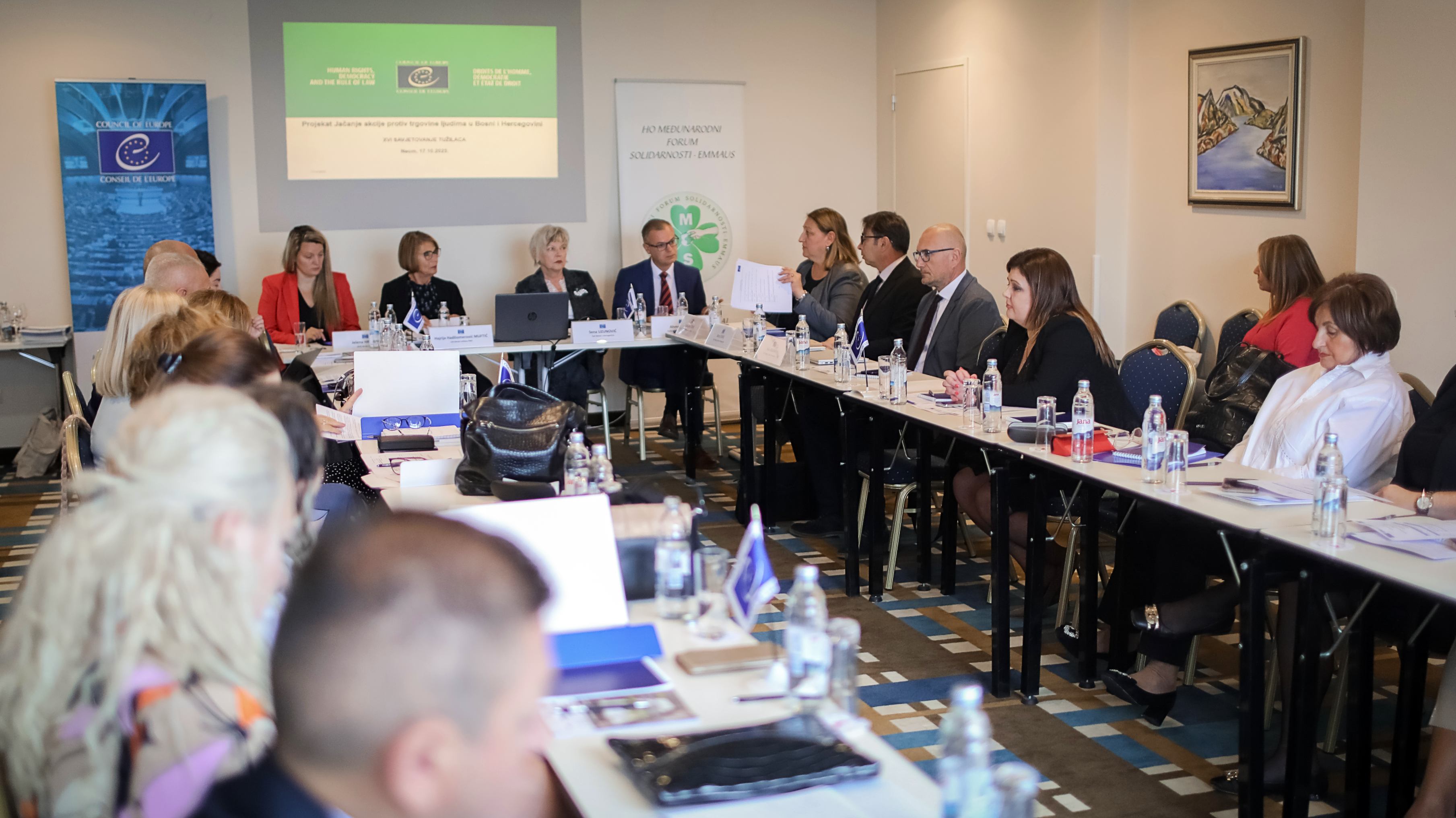Hotline: +381 61 63 84 071
The XVI Annual Prosecutorial Symposium held in Neum

Prosecutors from Bosnia and Herzegovina analyzed the challenges in processing cases of the criminal offense of human trafficking through a series of panel discussions on the topic "Human trafficking as a form of gender-based violence."
The panel dedicated to combating human trafficking was jointly supported by the office of the Council of Europe in Sarajevo within the project "Strengthening anti-trafficking action in Bosnia and Herzegovina" which is financed under the Action Plan for BiH (2022-2025), the OSCE Mission to BiH, the Atlantic Initiative, and the Emmaus International Forum of Solidarity, in cooperation with the Centers for the Education of Judges and Prosecutors of the Federation of Bosnia and Herzegovina and the Republic of Srpska, and the Association of Prosecutors of the Federation of Bosnia and Herzegovina. Over 25 legal experts from BiH and the region focused on essential topics such as gender-sensitive approaches in the fight against human trafficking and access to justice and legal remedies for women victims of violence and human trafficking. The panel offered an insight into the current situation in these areas as well as the challenges that the judiciary in BiH continues to face in processing cases related to human trafficking. In addition, during the panels, the participants were trying to think about solutions to overcome the legal and procedural obstacles that still arise in the work on such cases.
A trial simulation was led by Sena Uzunović, judge of the Court of BiH, and Ahmed Mešić, prosecutor of the Prosecutor's Office of BiH. Participants discussed the study "Promoting gender equality and combating gender-based violence and stereotypes as means of fighting against human trafficking," according to which gender-based discrimination and violence are deeply rooted in cultural norms and patriarchal attitudes that normalize such violence and make women more vulnerable to human trafficking.
Jelena Hrnjak, Programme Manager of NGO Atina from Belgrade and a consultant to the Council of Europe, had the opportunity to open the topic of the gender dimension of human trafficking and gender-sensitive treatment of victims and survivors with the present prosecutors. They also had a chance to become familiar with the mechanisms of social exclusion of certain groups from society (such as "victim blaming," labeling, social distancing, internalized oppression, and others). One of the prerogatives was to draw attention to the deep-rooted issues of stereotyping and prejudice in the existing justice systems and to show how much effort is needed to achieve a bias-free approach to work. Understanding these differences was essential, as violence and discrimination often stem from strict and restrictive gender norms and expectations, and prosecutors play a crucial role in recognizing and challenging the injustices and prejudices that arise from these norms.
Boris Topić, the Anti-Trafficking Officer at the OSCE Mission to BiH, emphasized the gendered nature of this criminal offense, emphasizing its different impact on women, men, girls, and boys. "This panel provided an opportunity to highlight that a victim's interaction with the criminal justice system is often conditioned by gender prejudice and stereotypes related to the ideal victim profile, which can lead to inappropriate questioning or even dismissal of victimization claims or denial of a victim status." Judge Sena Uzunović stated, "Human trafficking is a complex crime with many gender aspects and challenges that prevent the accountability of human traffickers and justice for the victims. Participants in this panel had the opportunity to learn how to overcome these challenges.”
The XVI Annual Prosecutorial Symposium, held in Neum from October 16 to 19, 2023, brought together more than 200 prosecutors and other criminal justice representatives from the entire region. In a series of different panel discussions, they discussed issues of importance to the criminal justice system's work. Over the years, this Symposium has become a significant gathering that offers valuable learning opportunities and creates a platform for meaningful discussion on topics of importance to this area of work.












 FACEBOOK
FACEBOOK TWITTER
TWITTER YOUTUBE
YOUTUBE